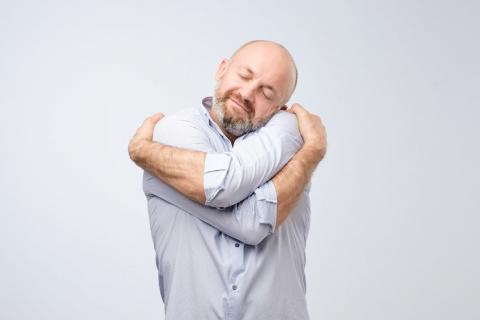
Is that even possible in this current world of online presence some may ask? Instagram and Facebook flash constantly with photo after photo. People around us, young to old and all in between taking THE selfie to post. How does this impact our feelings about our body?. Do we fit in? Are we good enough?, what do I need to have, show, cover? Concerns and confusions can emerge or challenge our past learnings.
Having recently attended a fashion show, models, both women and men, paraded their bodies to a rapt audience and their lack of cellulite was audibly noted. What are these unselfconscious bodies were expressing both sexuality and physicality? – each aspect different from the other, but inextricably intertwined.
In “Transforming Body Image” Marcia Hutchinson reminds us that “Your body image is not the same as your physical body. It is the way YOU see it and experience your body and not necessarily how others see it.”
A life time of experience and a myriad of influences go into the creation of feelings about one’s own body. This includes how we were touched and held during our early years, for even in infancy, we learn from our care giver’s responses to our body. This impacts not just how we feel about our bodies but how this effects our sexual connecting.
There is a huge variation in the way parents react to children’s naive freedom of interest in their bodies and their sexual parts. A parent’s response to a child’s openness about breasts or bottoms can deeply affect his or her belief as to whether a body is able to be enjoyed or talked about.
Parents’ affectionate and appropriate touch, praise and ongoing positive feedback during childhood continue to add to a developing body image. It’s not difficult to conclude how this will impact on self esteem. We know that parental or sibling teasing or criticism can have a destructive and long-lasting affect and are often never forgotten.
We are also influenced by the way our body has performed for us over the years as we have gone about our lives. And very importantly, we are influenced by the continuing assessment of our bodies by our parents, sibling, peers and our culture.
While we have been growing up, we have also been forming an image of ourselves and what it takes to be “sexy”. Women are pressured from many directions to try to be thin but curvaceous, young, smooth skinned with a model’s beauty. Men are equally bombarded with advice about how they will be loved and admired as tall and muscular, with a large penis capable of instantaneous, consecutive erections.
The reality is that most of us are average looking – and yet many people struggle with the knowledge that they will never attain anything like these imagined beauties. The resulting feelings of failure can underpin low self esteem.
Body image is a large part of self-esteem and can determine whether you feel good about yourself or not. It can impact on whether you think others will be attracted to you and whether you have the courage to approach the people to whom you are attracted. In short your body image mediates your sexuality.
When it comes to relationships, it helps to remember that the amount and distribution of the body hair you have, your height, your weight, or the size and shape of your breasts or penis do not determine how sexually responsive you are. Feeling sexy is mostly a state of mind – in fact it is the mind which is our primary sex organ. If you feel that you’re sexy, you’ll most likely dress and act like you’re sexy. Then you will find that other people will respond in their particular way to your sexiness.
However, if you feel negatively about yourself this will impact on the way you can enjoy your body. The negative feelings you have about your bodily characteristics will put a damper on your ability to be aroused or to be uninhibited. If you are troubled by real or imagined flaws, this will affect your ability to be relaxed enough to ‘go with the flow’ in a sexual situation
It helps to know that as a parent, you can provide the touch that makes us know - from the skin inward - that we deserve love and that our bodies are a source of pleasure. You can make a difference for your children by providing a loving family experience, which can be the antidote to society’s ridiculous stereotypes of what kind of body it takes to be lovable, and what kind of body can feel sensual and sexual pleasure.
As adults for ourselves, we can start right now from this moment today to correct those inner negative thoughts and take back the power of SELF appreciation. After all we all have a body, it is your body and this body keeps you alive, it serves you well. Show it love and care, treat it with respect, celebrate its uniqueness – we all come in different shapes and sizes, that is the reality!
Helen Mounsey and Paula Dennan
